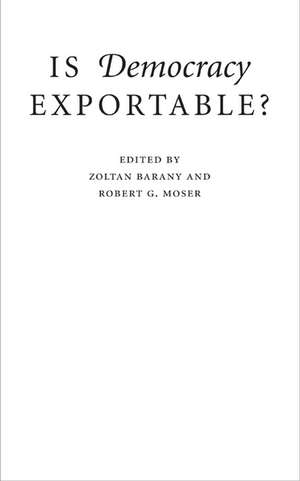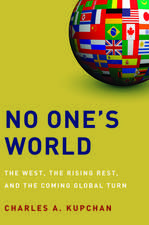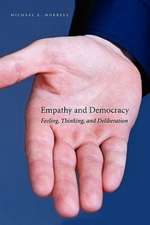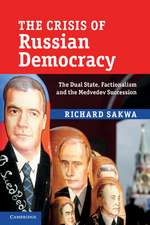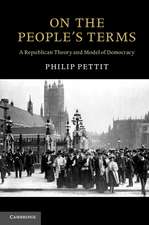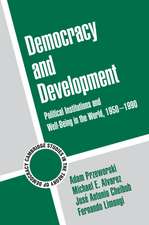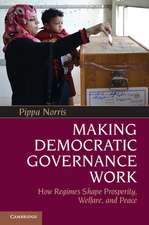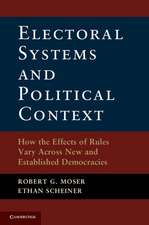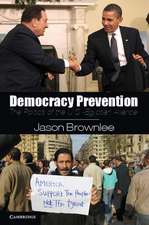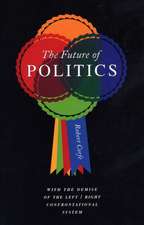Is Democracy Exportable?
Editat de Zoltan Barany, Robert G. Moseren Limba Engleză Hardback – 5 iul 2009
| Toate formatele și edițiile | Preț | Express |
|---|---|---|
| Paperback (1) | 280.62 lei 6-8 săpt. | |
| Cambridge University Press – 5 iul 2009 | 280.62 lei 6-8 săpt. | |
| Hardback (1) | 563.21 lei 6-8 săpt. | |
| Cambridge University Press – 5 iul 2009 | 563.21 lei 6-8 săpt. |
Preț: 563.21 lei
Preț vechi: 632.82 lei
-11% Nou
Puncte Express: 845
Preț estimativ în valută:
107.77€ • 115.24$ • 89.86£
107.77€ • 115.24$ • 89.86£
Carte tipărită la comandă
Livrare economică 17 aprilie-01 mai
Preluare comenzi: 021 569.72.76
Specificații
ISBN-13: 9780521764391
ISBN-10: 0521764394
Pagini: 316
Ilustrații: 3 b/w illus. 1 table
Dimensiuni: 160 x 240 x 22 mm
Greutate: 0.75 kg
Ediția:New.
Editura: Cambridge University Press
Colecția Cambridge University Press
Locul publicării:New York, United States
ISBN-10: 0521764394
Pagini: 316
Ilustrații: 3 b/w illus. 1 table
Dimensiuni: 160 x 240 x 22 mm
Greutate: 0.75 kg
Ediția:New.
Editura: Cambridge University Press
Colecția Cambridge University Press
Locul publicării:New York, United States
Cuprins
Introduction: promoting democracy Marc F. Plattner; Part I. A Moral Imperative?: 1. The morality of exporting democracy: an historical-philosophical perspective Thomas L. Pangle; Part II. Structural Preconditions: 2. Re-integrating the study of civil society and the state Sheri Berman; 3. Encountering culture M. Steven Fish; 4. Does democracy work in deeply divided societies? Daniel Chirot; 5. Democracy, civil society, and the problem of tolerance Adam Seligman; Part III. Institutions and Processes: 6. Electoral engineering in new democracies: can preferred electoral outcomes be engineered? Robert G. Moser; 7. Does it matter how a constitution is created? John Carey; 8. Building democratic armies Zoltan Barany; 9. Democratization, conflict, and trade Edward Mansfield and Jack Snyder; 10. Exporting democracy: does it work? Mitchell Seligson, Steven Finkel and Aníbal Pérez-Liñán; Conclusion Nancy Bermeo.
Recenzii
“This collection of searching essays by a group of distinguished policy-oriented scholars artfully combines contributions that reach deeply into history, philosophy, and culture with others that hew to tough-minded empiricism and practicality. Sobriety and optimism are present in equal measure, leading to telling insights about a basic question of our time: can well-intentioned outside actors affect the democratic destiny of countries around the world?”
– Thomas Carothers, Carnegie Endowment for International Peace
“This book provides a long-overdue corrective to the neglect of the empirical underpinnings of an increasingly important dimension of foreign policy and international relations – efforts to export or promote democracy around the world. It is a creative and solid piece of scholarship that examines this issue from virtually all relevant perspectives.”
– Richard Gunther, The Ohio State University
– Thomas Carothers, Carnegie Endowment for International Peace
“This book provides a long-overdue corrective to the neglect of the empirical underpinnings of an increasingly important dimension of foreign policy and international relations – efforts to export or promote democracy around the world. It is a creative and solid piece of scholarship that examines this issue from virtually all relevant perspectives.”
– Richard Gunther, The Ohio State University
Descriere
This books explains the normative and empirical issues behind the concept known as 'democracy promotion'.
